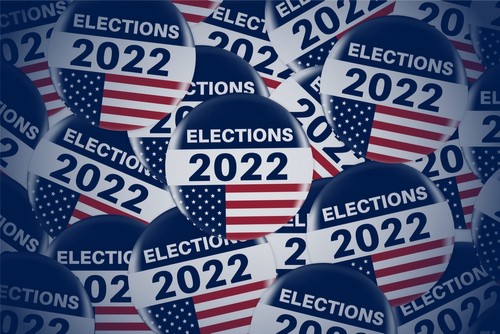2022 Midterm Elections: How Will It Affect Insurance?
U.S. voters will go to the polls on November 8 and lock in their choices for the mid-term election.
Up for election are senators, congressional representatives, governors and assorted state, , city, and town government officials across the fruited plains.
On voters’ minds too, is an array of national and geopolitical events, such as the Russia-Ukraine war, the winding down of a global pandemic, high inflation and skyrocketing consumer prices, and weakening financial markets.
With those issues paramount, voters may not give a thought to how the election will impact the U.S. insurance market – but they should.
“Recent events combined with inflation have skyrocketed insurance rates,” said Matt Miller, founder and chief executive of Embroker, a San Francisco-based business insurance company.
“In November voters will have to make a decision between more coverage and less choice.”
Over the past two years, an alarming amount of insurance companies have either dropped policyholders or have gone out of business altogether, as a combination of governmental restrictions and natural events have placed the home insurance industry in jeopardy, Miller noted.
“As the elections approach, politicians and state lawmakers have proposed a multitude of policies to either relax insurance regulations, or use state money to help insurers who are struggling to stay afloat,” he said. “This issue could impact elections as voters will have to decide whether they want fewer insurance companies that are more expensive but offer greater coverage, or a greater amount to choose from that will make premiums more affordable but
have limited coverage.”
“This issue will continue to have an impact on the elections as voters may have to choose between what they perceive as the lesser of two evils,” Miller added.

What’s at Stake in Washington, D.C.?
All 435 seats in the US House of Representatives are up for election this year, where Democrats are hanging on to an eight-seat majority.
Over in the U.S. Senate, the chamber is split 50-50 between Democrats and Republicans. On November 8, 35 Senate seats are open, with political pundits expecting several tight races. Currently, political dynamics favor the Republican party, which is not an uncommon occurrence at the two-year mark of a political rival holding the oval office.
“Historical trends show that momentum is in favor of the Republican party, and notably there are a historic number of Democratic House retirements,” said Alice Joe, a vice president on Fidelity’s Government Relations team. “It’s typical for control to flip when you have a first-term president who is in the same party that currently controls the House.”
History bears that sentiment out. Three of the past four U.S. presidents (Bill Clinton, Barack Obama, and Donald Trump) saw their political parties take a drubbing in the first-term senate and congressional elections.
“In fact, since 1862, the incumbent president’s party has lost House seats in 36 out of 40 midterm elections and Senate seats in 13 out of 19,” Joe said. “However, just like with investing, the past does not always predict the future; the House staying under Democratic control remains a possibility.”
What State and Federal Mid-Term Elections Mean for Health Insurance
The upcoming U.S. midterm elections present a number of important issues for the nation and its insurance industry – especially on the health insurance front.
“The balance of power in Congress may shift, with implications for the passage of future legislation,” said Charlie Leaver, chief financial officer at Healthier Trajectory, a health and wellness company. “The results of the elections may also impact the future of the Affordable Care Act (ACA) and other health care policies.”
State and federal midterm election results could have a significant impact on health policy, Leaver said.
“If the Republicans retain control of the House and the Senate, they may continue to pursue efforts to repeal and replace the ACA,” he said. “If the Democrats take control of one or both houses of Congress, they may be more likely to pursue measures to expand or strengthen the ACA.”
Results of the elections could also have an impact on Medicare and Medicaid.
“If the Republicans retain control of both houses of Congress, they may continue to pursue efforts to cut spending on these programs,” Leaver said. “If the Democrats take control of one or both houses of Congress, they may be more likely to pursue measures to expand or strengthen these programs.”
It’s U.S. seniors who may have the most significant impact on who’s calling the shots on U.S. health insurance policy
“Elections are decided by those who show up at polls and historically, older Americans have had a high voter turnout,” said Ari Parker, co-founder of Chapter, an online Medicare insurance broker. “This year many senior citizens will have a vested interest in protecting the benefits they receive from the federal government such as Medicare.”
One of the issues that will likely resonate with older voters is addressing the higher costs of living including the rising costs of healthcare.
“According to a new poll by the Kaiser Family Foundation, nearly half (46%) of adult Americans avoid getting the medical care they need because of the prohibitively high costs,” Parker said. “The same percentage of people also shared they found it hard to pay for dental care and one-third of the people polled answered they could not afford hearing or vision care.”
High-priced medical expenses are a daily struggle for families across the country and people are often forced to choose between feeding their families and staying healthy. “Many retirees are fed up and candidates who recognize this will be campaigning under this platform,” Parker added.
The Home Insurance Crisis and the Mid-Term Elections
On an equally critical front, the U.S. home insurance crisis may impact the elections and future policy in the states and in Washington, DC.
“The crisis has led to significant increases in premiums and deductibles, and has caused some homeowners to lose their homes,” Leaver said. “This has led to public anger, and may lead to some candidates being elected who are more sympathetic to the needs of homeowners. In Washington, D.C., the crisis has led to the creation of a task force to investigate the
increase in rates.”
In select states, the midterm elections will likely have a significant impact on the ongoing
crisis in the home insurance sector.
“In states like Florida, where insurers have been dropping coverage and premiums have skyrocketed, voters are demanding action from their elected officials,” said Linda Chavez, chief executive officer of Seniors Life Insurance Finder in Los Angeles, California. “This could result in
increased pressure for reform at the state level, as well as potentially shaping the national conversation on insurance regulation.”
Additionally, the results of the elections could affect the composition and priorities of key committees and decision-makers in Washington, D.C. “For example, a change in leadership of the House Financial Services Committee could lead to different approaches to addressing the home insurance crisis,” Chavez said.
The Mid-Terms and Other Types of Insurance
The mid-terms may also impact other types of insurance, such as auto and life insurance.
“There may be potential cost impacts for consumers and businesses,” Leaver said. “For example, if the Republicans retain control of the House of Representatives, they may continue to pursue efforts to cut taxes. This may lead to increased premiums for auto and life insurance.”
The election impact on other types of insurance largely depends on the composition of the new Congress.
“If there is a shift towards more Democratic control, there may be increased regulation and oversight in the insurance industry, which could potentially lead to higher costs for
consumers,” Chavez said.
On the other hand, if there is a shift towards more Republican control, deregulation efforts could lead to lower costs for consumers.
“It’s difficult to predict exactly how the midterms will impact the overall insurance industry, but it is important for consumers to stay informed and monitor any potential changes,” Chavez noted.
The Takeaway on the Mid-Terms and the U.S. Insurance Market
What might the US insurance landscape look like when the elections are
over? Industry experts expect don’t expect big changes, but some shifts may be on the horizon.
“The midterm elections could potentially have a significant impact on the US insurance sector, particularly if there is a shift in party control of Congress,” Chavez said. “For example, if Democrats gain control of the House or Senate, they may push for stricter regulations on the industry. On the other hand, if Republicans maintain or increase their majority, they may continue to support measures that reduce regulation and give more power to states.”
Regardless of the outcome, it’s likely that consumers and businesses will continue facing competitive market conditions and potential rate fluctuations in the insurance sector,” Chavez added. “It’s important for both individuals and companies to regularly review their coverage options to ensure they are getting the best deals.”
“As always, it is also important to stay informed about any industry changes and updates to insurance policies,” she said.
Other experts believe the code governing the insurance sector seems to be
safe from any tectonic shifts after the mid-term elections.
“That’s primarily due to the gridlock in the federal legislatures, where currently Republicans are expected to take control of the House and Democrats to retain the Senate,” said Rick Nehora, managing partner at California Law Firm, in Newport Beach, Cal. “That discrepancy would ensure that no earth-shattering legislation emanates into the U.S. insurance sector.”
However, as consumers put more money into the economy, the insurance market is set to grow.
“More money in the economy brings more spending, which ultimately leads to more people buying insurance policies,” Nehora added. “The mid-terms will bring no surprises, but the insurance sector is expected to balloon anyway.”
